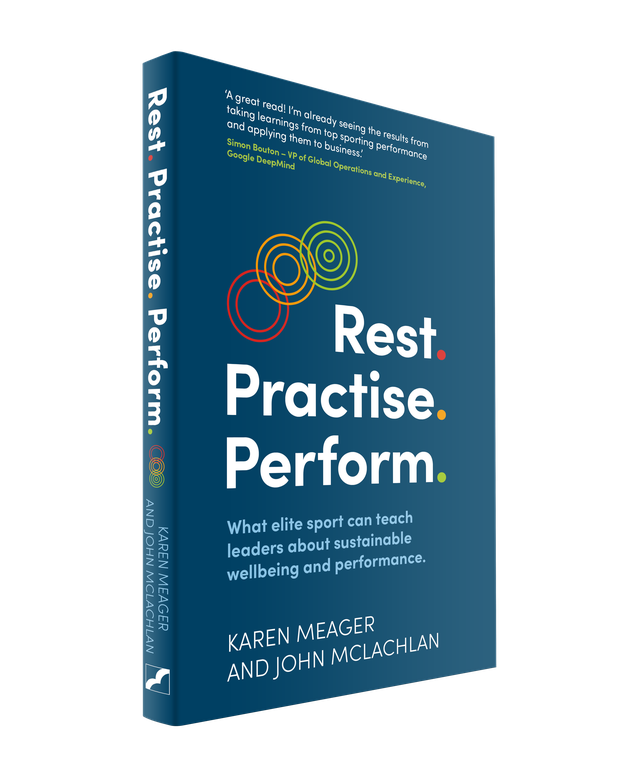Improve your rest to improve your performance? Karen Meager is co-author of Rest. Practise. Perform; What Elite sport can Teach Leaders about Sustainable Wellbeing and Performance, so who better to offer expertise on the value of rest:
Elite sports stars spend far longer in the rest and practise phases than performing, but what they do in the rest and practise phases is a critical part of what helps them to perform when it matters. When we conducted research for our latest book, Rest. Practise. Perform., we found that elite sports have a lot to teach us about how to rest and as a result, perform better.

Rest is essential to recoup what is lost during performance. Sports professionals don’t just stop when they are in a rest phase, many of them remain active. However, they are ‘resting’ a few essential parts of themselves. Usually, they need to rest whatever muscles in their body are activated in their particular sport, and they also need a rest from the pressure of competition. Many sportspeople enjoy other sports, that they do just for fun. For example, many footballers play golf recreationally.
Elite sports teach us that well-rested people perform better, so if we want to perform better in our chosen profession, we need to become better at resting. Burnout is the most prominent and most frequently identified consequence of a lack of conscious rest in the world of work. When I conducted my own research into burnout recovery, I noticed that while people who recovered quickly might have needed complete rest initially, they soon got active again. But not active at work; they did something that broadened their horizons: an interest or a hobby. Those who did return to being active at work found a different way of engaging with it, writing rather than speaking, reading, or learning rather than executing. This seems to be the non-sports person’s equivalent of rest.
Here are some examples of different types of work and what you can do to get the right kind of rest:
Emotional
Emotionally draining work can be anything where you need to engage with peoples’ difficulties and struggles at a human level. People who engage in emotionally draining work include HR professionals, coaches, medical professionals who engage with the public, therapists, and managers and leaders (management and leadership roles have become increasingly pastoral in recent times).
If you engage in this kind of work, you will need a break from it every now and then. So, you might organise all work that falls into this category into a few days a week, giving you time on more cerebral or practical matters for the rest of the week. Some leaders, for example, chunk their team development work into an intense period and then spend a few weeks on non-team matters. A lot of people find this more useful than spreading emotionally draining work out. If you can’t escape it, then you need to pace out your holidays and make sure you switch off and also make sure your personal life provides you with some respite from it – so minimal dramas in your private life.
Mental
People who have to focus and concentrate over long periods of time are at risk of exhaustion from the mentally taxing nature of this work. This work is mainly technical in some way and can include people who work in tech, architects, technical designers, and engineers. To give yourself a mental rest, do something physical or practical. You could take some walks in the fresh air between bouts of mental intensity or spend some time building something concrete or tactile. Additionally, these people tend to do a lot of work alone, so (leaning into a change is as good as a rest) a rest can include participating in some group project or undertaking something social. Another way people get mental rest is to focus on just one thing if normally they are overseeing a lot of things, or vice versa. This switch gives their minds an effective mental rest.
Creative
People who engage in creative work are frequently compelled to do something creative with pretty much everything they experience. It’s how their mind is programmed. It is a real gift, but it can also be exhausting. People who engage in creative work get rest by taking things as they are, appreciating something for what it is and looking for simple straightforward solutions. Most creative people have some of these elements in their work, so organising them in such a way that they do them in one period of time will help them to switch their mind off from generating creative work and give it some well needed rest.
Physical
Nowadays, for most of us, work is much less physically draining, but there are exceptions. People who train or make presentations do a lot of standing, as do those who work in retail or security – people in these roles will need physical rest. While more of us are working part or all of the week from home, many still undertake relatively punishing commutes which are uncomfortable and sometimes stressful; this needs to be taken into account when considering rest strategies. The key is to work out whether there is a part of your work which is physically draining and plan appropriate physical rest.
ABOUT THE AUTHOR

Karen Meager is co-author of ‘Rest. Practise. Perform. What elite sport can teach leaders about sustainable wellbeing and performance’. Karen takes the latest scientific and academic thinking and makes it useful and easy to apply. Her approach is grounded in research and professional practice that spans 20-plus years. Karen holds master’s degrees in psychology and health research, and her specialist research area is mental health and burnout in organisations. Karen’s goal with ‘Rest. Practise. Perform.’ is to help leaders and organisations find a working rhythm that delivers top performance whilst also prioritising people and their health.
monkeypuzzletraining.co.uk/books/rest-practise-perform and find Karen on LinkedIn @karenmeager









